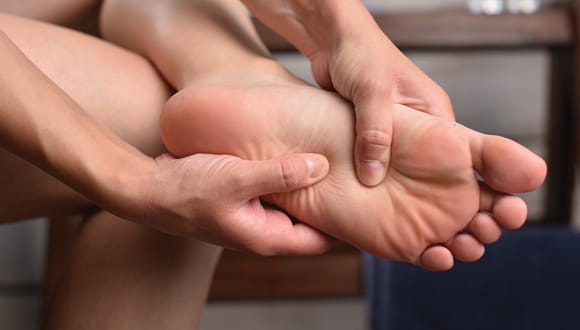What Are the Early Warning Signs of Neuropathy?
March 6, 2024 - Katie McCallumFrom headaches to muscle cramps to insect stings, we're no strangers to the various causes of sudden, yet temporary, pain. But what about when pain is an ongoing sensation that won't go away or comes and goes without warning? Could it be an issue with your nervous system?
"When damage occurs to peripheral nerves — nerves outside of the brain and spinal cord — it's called peripheral neuropathy," explains Dr. Jun Li, professor and chair of neurology at Houston Methodist, who specializes in peripheral nerve diseases. "People don't realize how prevalent this is. About 3%-5% of adults over the age of 50 have peripheral neuropathy, which is at a rate comparable to stroke."
Why aren't people as familiar with neuropathy as they are with other health problems? The vagueness of its earliest signs might be to blame. The gradual nature with which symptoms develop and progress likely doesn't help either. And by the time neuropathy starts to affect functions, like balance and mobility, people often chalk their problems up to getting older.
But Dr. Li says it shouldn't be that way.
"This is a progressive condition that, if left untreated, can eventually cause permanent nerve damage, leading to loss of function in the body," warns Dr. Li. "Early intervention can help produce better outcomes, so it's important to recognize the signs of neuropathy and take action."
What causes neuropathy?
Nerves are like tiny wires that carry messages between your brain and the rest of your body — helping you feel sensations like touch, temperature and pain. They also control your muscles and help you move.
The damage that occurs with neuropathy can affect how nerves work, leading to various symptoms in different areas of the body.
"There are many potential causes of nerve damage," says Dr. Li. "As such, there are also many different types of neuropathy."
Peripheral neuropathy causes include:
- Diabetes – damage to nerves throughout the body is perhaps one of the lesser-known consequences of prolonged high blood sugar
- Chemotherapy – nerve damage is a side effect of this cancer treatment
- Vitamin deficiency, such as vitamin B deficiency – certain vitamins, such as vitamin B12, are crucial for healthy nerves
- Autoimmune conditions – when the body mistakenly attacks its own nerves
- Inherited nerve disease, such as Charcot-Marie-Tooth disease – nerve damage resulting from a hereditary genetic condition
Diabetes accounts for around half of all cases of peripheral neuropathy, making diabetic neuropathy the most common type. The increasing numbers of people being diagnosed with Type 2 diabetes each day is why the prevalence of neuropathy has also been on the rise in recent years.
"In about 30% of cases, though, we can't find a cause," says Dr. Li. "This is called idiopathic neuropathy."
Important to note is that, even when the underlying reason can't be identified, doctors do know that idiopathic neuropathy is associated with a higher risk of prediabetes and metabolic syndrome — two issues known to lead to Type 2 diabetes.
Symptoms of neuropathy: The signs not to ignore
Neuropathy symptoms can be highly variable, depending on type and severity.
Early symptoms manifest in the extremities and include:
- Numbness and tingling
- Sharp or shooting pain
- Sensitivity to light touch and pressure
- Muscle weakness
"These early symptoms typically start in the feet and move upward into the legs," says Dr. Li. "Similar symptoms may develop in the hands, eventually moving into the arms, and so on."
Neuropathy symptoms can fluctuate over time, coming and going or getting more or less severe over time. If the condition is allowed to progress, the more obvious motor and sensory symptoms of neuropathy begin to develop.
"Numbness, muscle weakness and the other sensory symptoms lead to problems with balance and coordination, making everyday activities like walking and climbing the stairs difficult," says Dr. Li. "As these issues become more and more severe, the risk of falls increases."
Nerve pain, also called neuropathic pain, can become more severe, too — sometimes even debilitating. In fact, many people with diabetic neuropathy report pain as one of the most disabling symptoms.
Can neuropathy be reversed?
Because the disorder progresses over time, Dr. Li stresses the importance of identifying the signs of neuropathy early and prompt evaluation by a neurologist.
"The goal is to identify the underlying cause so we can control it," says Dr. Li. "This involves asking questions about your symptoms and conducting a physical exam, but the most essential tool we use is electromyography, or EMG. This helps us assess how peripheral nerves are functioning."
He adds that an EMG is the first test a neurologist will run, but other tests — imaging, blood tests, even genetic testing — may also be needed. Once neuropathy's cause and severity are determined, the focus becomes controlling the issue and treating any disabling symptoms, like nerve pain, in the meantime.
"If it's diabetic neuropathy, we need to make sure diabetes stays well managed," explains Dr. Li. "If it's autoimmune-induced neuropathy, we need to dampen inflammation via anti-inflammatory medications."
Controlling the cause of neuropathy can help slow damage to peripheral nerves and possibly even reverse symptoms. Leaving the condition untreated, on the other hand, can lead to permanent nerve damage — which can't be reversed. This comes with serious consequences.
"For instance, loss of sensation in the feet can make it easier to develop ulcers. Untreated ulcers can lead to bone infections that require amputation in some cases," warns Dr. Li. "Diabetic neuropathy is actually one of the most common reasons for lower limb amputation."
Additionally, studies show that untreated peripheral neuropathy significantly increases the risk of falls — which can lead to injuries and hospitalizations, as well as loss of mobility and independence.
"Early intervention can help prevent these serious consequences, so it's very important to seek evaluation if you notice the signs of neuropathy," adds Dr. Li.








